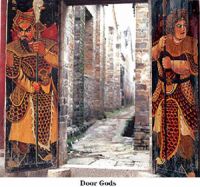Difference between revisions of "Door God"
imported>Ciic m |
imported>Ciic |
||
| Line 1: | Line 1: | ||
[[Image:Chuxi2.jpg|thumb|right|200px]] | [[Image:Chuxi2.jpg|thumb|right|200px]] | ||
| − | Every year on New Year's Eve, people paste up images of the '''Door God''' on the entrances to their homes. The Door God, or guardian of the threshold, is a very old deity. In its earliest incarnation, it was embodied in the door itself. The Door God was first portrayed in human form during the [[Han Dynasty]], first as the warrior Cheng Qing, and later as Jing Ke. The door gods of the [[Northern and Southern Dynasties]] were named Shen Tu and Yu Lei. During the [[Tang Dynasty]], two great generals named Qin Shubao and Yuchi Jingde were in charge of protecting the officials of the imperial palace. [[Emperor Tang Taizong]] (Li Shimin) felt that the generals were working too hard, so he ordered their portraits to be painted and hung beside the palace door to assist them. The two generals thus became associated with the ancient guardians of the threshold, and have been known as door gods ever since. During the [[Five Dynasties]] Period, Zhong Kui became the new door god. The [[Song Dynasty]] saw the further development of existing guardians and protectors. In addition to door gods, images of the gods of Blessings, Prosperity, and Longevity, as well as the Ten Thousand Deities and the Three-Treasures Buddha, are often hung in living rooms and bedrooms. These guardian deities were thought to protect the household from evil influences and repel demons. | + | Every year on New Year's Eve, people paste up images of the '''Door God''' (门神) on the entrances to their homes. The Door God, or guardian of the threshold, is a very old deity. In its earliest incarnation, it was embodied in the door itself. The Door God was first portrayed in human form during the [[Han Dynasty]], first as the warrior Cheng Qing, and later as Jing Ke. The door gods of the [[Northern and Southern Dynasties]] were named Shen Tu and Yu Lei. During the [[Tang Dynasty]], two great generals named Qin Shubao and Yuchi Jingde were in charge of protecting the officials of the imperial palace. [[Emperor Tang Taizong]] (Li Shimin) felt that the generals were working too hard, so he ordered their portraits to be painted and hung beside the palace door to assist them. The two generals thus became associated with the ancient guardians of the threshold, and have been known as door gods ever since. During the [[Five Dynasties]] Period, Zhong Kui became the new door god. The [[Song Dynasty]] saw the further development of existing guardians and protectors. In addition to door gods, images of the gods of Blessings, Prosperity, and Longevity, as well as the Ten Thousand Deities and the Three-Treasures Buddha, are often hung in living rooms and bedrooms. These guardian deities were thought to protect the household from evil influences and repel demons. |
[[Category:customs]][[category:spring festival]][[category:traditional festivals]] | [[Category:customs]][[category:spring festival]][[category:traditional festivals]] | ||
Latest revision as of 03:10, 4 June 2013
Every year on New Year's Eve, people paste up images of the Door God (门神) on the entrances to their homes. The Door God, or guardian of the threshold, is a very old deity. In its earliest incarnation, it was embodied in the door itself. The Door God was first portrayed in human form during the Han Dynasty, first as the warrior Cheng Qing, and later as Jing Ke. The door gods of the Northern and Southern Dynasties were named Shen Tu and Yu Lei. During the Tang Dynasty, two great generals named Qin Shubao and Yuchi Jingde were in charge of protecting the officials of the imperial palace. Emperor Tang Taizong (Li Shimin) felt that the generals were working too hard, so he ordered their portraits to be painted and hung beside the palace door to assist them. The two generals thus became associated with the ancient guardians of the threshold, and have been known as door gods ever since. During the Five Dynasties Period, Zhong Kui became the new door god. The Song Dynasty saw the further development of existing guardians and protectors. In addition to door gods, images of the gods of Blessings, Prosperity, and Longevity, as well as the Ten Thousand Deities and the Three-Treasures Buddha, are often hung in living rooms and bedrooms. These guardian deities were thought to protect the household from evil influences and repel demons.
